OVERVIEW
With strategic funding the UCLA Division of the Humanities and Social Sciences received from the Mellon Foundation, the Mellon Data & Social Justice Curricular Initiatives Program is pleased to announce new teaching incentive grants for enhancing Digital Humanities course offerings at UCLA.
We will offer awards to research accounts of $10,000 to develop new undergraduate and graduate courses to teach in the areas of critical data studies, data & society and digital humanities, using social justice frameworks. Cross-listed courses between faculty members home departments and digital humanities are encouraged. We are also interested in supporting courses combining digital humanities and a community-engaged pedagogy in relation to Los Angeles. These new courses will contribute to enhancing course offerings in the rapidly growing Digital Humanities Program, as well as UCLA’s strategic goal of greater engagement with Los Angeles communities. The faculty award recipients will form a cohort of colleagues who convene quarterly to shape a broader data-centered social justice curriculum, reaching across academic departments at UCLA. Preference will be given to faculty in the Divisions of the Social Sciences and Humanities.
The Data & Social Justice Teaching Grant recipients will then work with their department chair to schedule and teach their new course in collaboration with the Program in Digital Humanities during AY 2024-25, 2025-2026 or 2026-2027.
Each grant recipient will receive an award of $10,000 to be transferred to the awardee’s research account. Faculty members are encouraged to work closely with the departmental chair to facilitate the cross-listing and scheduling of this course.
ELIGIBILITY
UCLA ladder faculty in the Humanities and Social Sciences are eligible to apply.
The Program
Mellon Social Justice Teaching Grant recipients will participate in the following activities during Academic Year 2024-2025:
-
- An initial gathering pre-Fall or early quarter with a focus on social justice pedagogy, community-engaged, and/or digital humanities course development
- A once-per-quarter meeting of the Data & Social Justice Teaching Grant program cohort to advance their work through innovative course design, culminating in a fully developed new course syllabus by Spring Quarter 2025.
Application deadline: May 15, 2024
*Applications will continue to be accepted while grants are available.
To apply, submit the following:
-
- Letter of application that addresses the following:
- Proposed new course topic in critical data studies or digital humanities
- How the proposed course builds on your research and teaching experience
- How the proposed course would contribute to building curricular offerings focused on data, society, and social justice
- If your proposed course would utilize community-engaged pedagogy, identify prospective community partners and describe your prior experience with community-engaged work
Indicate whether you propose to offer this course within your home department or another academic unit (i.e. Digital Humanities, Masters in Social Sciences) - If your proposal is to offer this course within your home department, provide an endorsement letter from your department chair confirming that this new course has the support of the department and can be offered as a department based and/or cross-listed course within the next two academic years
- If the proposal is to offer this course outside your home department, provide an endorsement letter from your department chair and the outside unit chair.
- Curriculum Vitae
- Letter of application that addresses the following:
Please submit you application materials to the Center for Community Engagement email account: communityengagement@college.ucla.edu
For further information about the Mellon Social Justice Teaching Incentive Grant program, please contact Dr. Munia Bhaumik, Program Director of the Mellon Social Justice Curricular Initiatives (munia@college.ucla.edu).
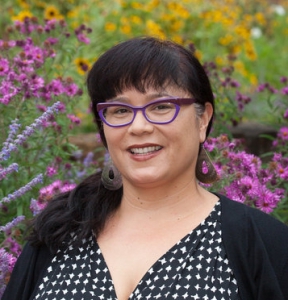
Maylei Blackwell
Professor Blackwell is developing an impactful graduate level course which will instruct doctoral students on how to build and maintain community-based research relationships using digital humanities tools. The goal of the course is to support graduate students, who are often driven by their commitment to social justice and desire to conduct community-relevant research, on the best research protocols and ethics of partnering with community organizations to produce public-facing scholarship. Professor Blackwell’s own outstanding twenty-five years of record of feminist community-engaged research connects community archives, indigenous women’s organizing between Mexico/Los Angeles and digital mapping. Both her teaching and research explore questions of data sovereignty, Indigenous research protocols, and the role of memory and place in how Indigenous people survive colonial dispossession, and how Indigenous diasporas create cultural continuity through their own memory work but also their own informal practices of archiving.
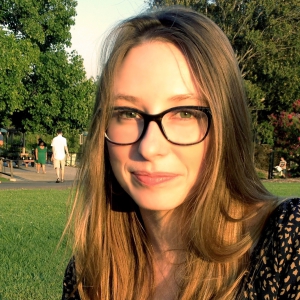
Stephanie Bosch Santana, Ph.D. (she/her)
Professor Bosch Santana will use the grant to further develop her “Digital Africa and the World” class through a collaboration with the Story Club in Malawi. Open to graduate students and advanced undergraduates, the course will partner with the Story Club to produce literature and arts-based programs that can be aired on the Story Club’s online radio station, the first in the country dedicated to arts and culture. “Digital Africa and the World” will be offered as a Comparative Literature course in Spring 2024.
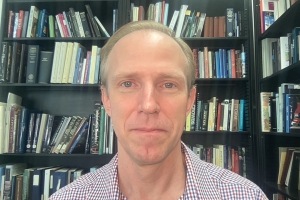
Chris Johanson
power relationships in ancient Rome, Professor Chris Johanson developed a new
course for the Digital Humanities Program that teaches students to critique existing
structured databases, first centered on ancient Rome, then on the implicit networks housed within WikiData. This innovative approach to teaching about antiquity as a guide to studying modernity and the semantic web empowers students to reimagine and implement their own network graph visualizations. Fundamental to the course is a critical approach to data analysis and the representation of those who, through the exigencies of the accident of preservation, or gaps in data entry priorities, have been lost from the evidentiary record. For example, students will learn how lost and marginalized people (who are not included in extensive network graphs of past or present individuals) can nonetheless be accounted for by inferences in databases. Professor Johanson’s course builds upon his excellent record of teaching students on how to focus on networked relationships present within the Digital Prosopography of the Roman Republic (DPRR) by learning about and using RDF triples, graph databases and database queries (SPARQL), and web-
based visualization libraries (D3 and Observable).
The following cohort represent the inaugural recipients of the Mellon “Data, Justice, and Society” course development grants (see Faculty Mellon Awards). Their innovative course designs significantly contribute to the growing curricular initiatives at UCLA designed to teach students about critical and applied approaches to data through various pedagogical frames: community-engagement, digital humanities, and critical theory.

David MacFadyen
Employing a Digital Humanities framework, Professor MacFadyen is developing a course titled “Freedom of Speech in Russia: Decentralized Tools for Musicians and Journalists” which offers students an opportunity to create a blockchain-based and anonymized social justice-oriented publishing platform. The impact of this digital tool will be to launch an unforgeable and decentralized media platform for displaced people, many of whom have been impacted by the Russian war against Ukraine. In addition to nearly two million persons who have been displaced by this war, the rights of journalists, artists, and protestors in the region have been suppressed while disinformation has spread. In constructing a blockchain news platform in collaboration with students, MacFayden will address these intersecting crises of rights by launching a new digital space where verifiable, published content which counters this political repression and violence is publicly accessible.
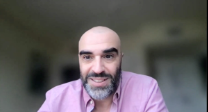
Davide Panagia
Based on his current research ““#datapolitik: On the Political Theory of Data,” Professor Panagia is developing a course for a social justice-oriented course which exposes students to developments in new forms of critical thinking for the study of data and society. The course proposes to look to the changing nature of political thinking given the emergence of data and algorithms as the principal media in contemporary democratic life. The course will ask students to interrogate familiar concepts in the history of political thought (freedom, justice, equality, race, ethnicity, gender) in relationship to new and emerging media and the expectations and claims these media place on users. The learning objective of the course is to study political ideas in relationship to, and embedded with, the specific medium of data.
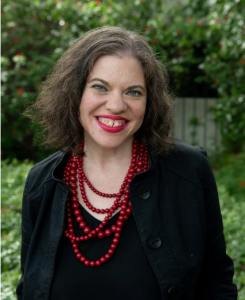
Miriam Posner
“Data from the Margins”
Professor Posner is developing a course in community with fellow social justice-minded data
Practitioners. She will teach students about how data has paradoxical relationship. The course will analyze how, on the one hand, data has a history within a long tradition as a weapon of discrimination; alternatively, oppressed communities have an equally long tradition of reconceiving, reworking, and remaking data in order to fight back. Her innovative course design will consult activists and scholars who are making change for their communities as they challenge everyone to rethink what data can do. Specifically, she will be situating data studies in relation to a growing body of critical work by Black, indigenous, and/or feminist scholars. Moreover, employing a digital humanities framework, students enrolled in Posner’s course will have the opportunity to combine readings with hands-on data exercises, framed as provocations, making use of the p5 JavaScript library developed here at UCLA for computer generated art practice.
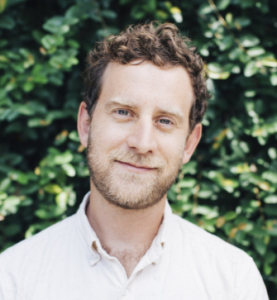
Nicholas Shapiro
Building on the work he began as a Chancellor’s Award for Community-Engaged Scholars recipient, Professor Shapiro will be developing a course titled “Science, Mass Incarceration, and Accountability.” The Mellon grant will enable him to refine and properly scaffold a critical data studies intervention into a course about mass incarceration. Shapiro is designing the course as being split into two complementary halves. The topics of the first half will include: a general introduction to mass incarceration and what data can and can’t tell us about this archipelago of nearly seven thousand carceral facilities, unethical scientific knowledge extraction from incarcerated people, carceral tech, and the conflicts of interest and biases of medical examiners that are supposed to be the sources of biomedical accountability for deaths that occur in custody. The second half moves into the nitty gritty details of the data practices of medical examiners that result in death determinations for people who die in the custody of law enforcement. Moreover, students will be introduced to how to adapt a protocol for analyzing autopsies in relation to the needs of a community partner and the parameters of the local medical examiner.
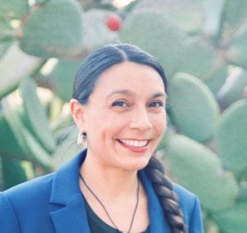
Veronica Terriquez
Professor Terriquez is designing a course titled “Community-Engaged Research Methods: Surveying Racially Diverse Youth and Workers” which will train students in designing, drafting, piloting, and administering a new survey focused on transitions to adulthood. She proposes to guide students in designing a survey and gathering extensive data on the workforce development, labor rights, education, health, mental health, and civic engagement of young people residing in BIPOC communities disproportionately impacted by the COVID-19 pandemic. The course will expose students to the historical development of racial statistics, the role of racial statistics in contemporary life, and critical quantitative science. It will also include testing questions on racial identity and attitudes; gender identity; workforce development; labor rights; healing and wellness; and other topics determined by community partners serving Latinx, AAPI, Black, and Indigenous youth. Additionally, students will learn about the strengths and weaknesses of different survey sampling methodologies aimed at gathering data from BIPOC youth, low-wage workers, and students. Specifically, she hopes to invite and collaborate with the following community partners: Future Leaders of America (Oxnard), InnerCity Struggle (Eastside of Los Angeles); Community Coalition (South Central LA); Loud4Tomorrow (Delano); 99Rootz (Merced); Resilience OC (Santa Ana); MidCity CAN (San Diego); Youth Together (Oakland); Inland Empire Immigrant Youth Coalition (San Bernardino/Riverside). These 501(c)3 non-profit organizations are all currently part of California Freedom Summer, a participatory action research course on youth civic engagement, which Terriquez leads.

